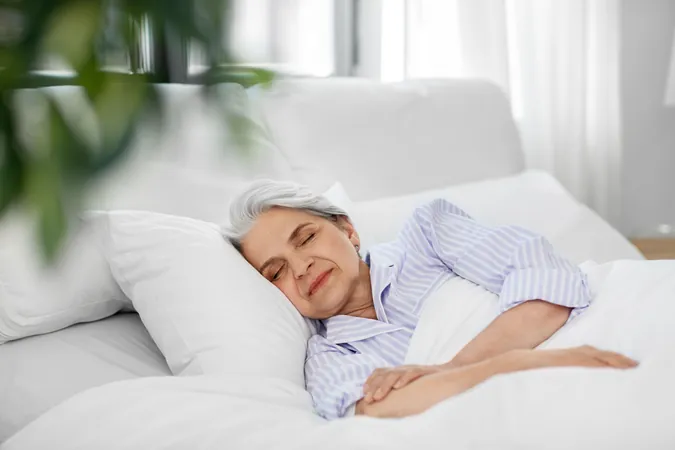
Unlocking Better Sleep: A Key to Overcoming Resistant Depression in Seniors
2025-04-03
Author: Emma
Unlocking Better Sleep: A Key to Overcoming Resistant Depression in Seniors
In the ongoing battle against treatment-resistant late-life depression (TRLLD), researchers have uncovered a powerful ally: restorative sleep. A recent analysis reveals that older adults suffering from TRLLD are three times more likely to respond positively to changes in their antidepressant treatment when their sleep patterns improve. This groundbreaking insight emerged from the Optimizing Outcomes of Treatment-Resistant Depression in Older Adults (OPTIMUM) trial.
Dr. Michael Mak from the University of Toronto and his team examined data from the trial, aiming to understand how sleep quality influences the outcomes of depression treatments. Their findings indicate that addressing sleep-related symptoms might be crucial in helping patients achieve and maintain a positive response to antidepressants.
The OPTIMUM trial explored several pharmacological strategies for individuals with TRLLD, testing not only medication adjustments but also the impact of sleep quality on treatment effectiveness. Researchers hypothesized that most patients would show sleep disturbances and that improvement in sleep could lead to a notable reduction in depression symptoms.
Their analysis categorized participants based on their sleep quality at both the beginning and the end of a 10-week treatment period. Ultimately, they found that over half of the patients reported sleep issues at the trial's start, but by the end, this number diminished to 36%. Notably, those participants who maintained sufficient sleep or showed signs of improved sleep were far more likely to see a decrease in their depressive symptoms compared to those with persistent sleep issues.
The researchers identified that 25% of participants exhibited continual insufficient sleep, while 10% reported worsening sleep—both groups were less likely to respond to treatment. In contrast, nearly a third of those who secured adequate sleep during the trial reported substantial improvements in their mood, irrespective of the antidepressant strategy employed.
Moreover, nearly one-third of participants were on sedative medications for sleep or anxiety, prompting the researchers to caution against their use due to potential risks, especially in older adults. They recommended educating patients about the dangers of long-term benzodiazepine use alongside promoting healthy sleep habits.
Dr. Benoit Mulsant, co-author of the study, highlighted an essential and often overlooked aspect: the correlation between sleep disturbances and depression is notoriously bidirectional. Not all patients will find relief from insomnia simply by treating their depression. Therefore, tailored approaches that address sleep issues alongside depression treatment may be necessary, as lingering insomnia poses a significant risk for recurrent depressive episodes.
Furthermore, for patients with ongoing sleep disruptions that predate their depression, interventions such as Cognitive Behavioral Therapy for Insomnia (CBT-I) should be considered essential components of their treatment plan. Dr. Mak emphasized that if insomnia persists after antidepressant treatment, methods like sleep hygiene education and behavioral therapies could be key in managing these symptoms effectively.
The study also revealed that specific hardships like the loss of a spouse and low educational attainment correlate with an increased likelihood of sleep difficulties. Therefore, the researchers advocate for focused attention on sleep management for these particularly vulnerable populations.
For older patients, potential pharmacological options revealed promising avenues. Mirtazapine at lower doses may assist in managing sleep without causing excessive sedation, while low doses of doxepin may improve sleep quality. However, careful evaluations are essential for those showing signs of co-existing conditions, such as sleep apnea, which can significantly affect both sleep quality and depressive symptoms.
In the quest to adequately address resistant depression in older adults, the intersection of sleep hygiene, effective antidepressant treatments, and behavioral interventions stands crucial. As experts continue to delve deeper into these relationships, a brighter future awaits seniors struggling with depression, heralded by the realization that better sleep might indeed be the gateway to improved mental health.









 Brasil (PT)
Brasil (PT)
 Canada (EN)
Canada (EN)
 Chile (ES)
Chile (ES)
 Česko (CS)
Česko (CS)
 대한민국 (KO)
대한민국 (KO)
 España (ES)
España (ES)
 France (FR)
France (FR)
 Hong Kong (EN)
Hong Kong (EN)
 Italia (IT)
Italia (IT)
 日本 (JA)
日本 (JA)
 Magyarország (HU)
Magyarország (HU)
 Norge (NO)
Norge (NO)
 Polska (PL)
Polska (PL)
 Schweiz (DE)
Schweiz (DE)
 Singapore (EN)
Singapore (EN)
 Sverige (SV)
Sverige (SV)
 Suomi (FI)
Suomi (FI)
 Türkiye (TR)
Türkiye (TR)
 الإمارات العربية المتحدة (AR)
الإمارات العربية المتحدة (AR)